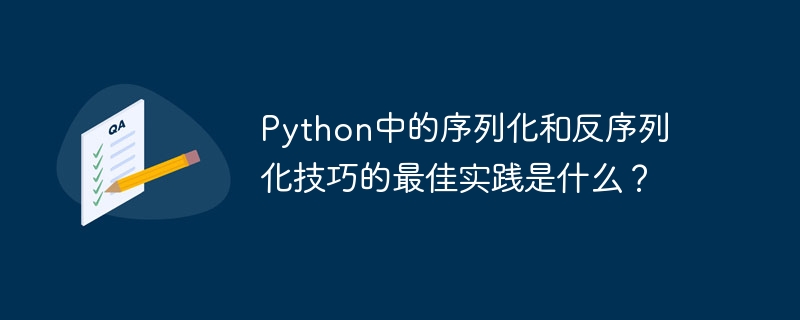

What are the best practices for serialization and deserialization techniques in Python?
Serialization and deserialization are commonly used technologies in data storage, data transmission and other scenarios. In Python, serialization and deserialization can be used to convert an object into a format that can be stored or transmitted, and then convert it back into an object. This article will introduce best practices for serialization and deserialization in Python, including using the pickle and json libraries, and how to handle the serialization and deserialization of custom objects.
Pickle is one of Python’s standard libraries for serializing and deserializing objects. It provides a simple API to easily convert objects to byte streams and byte streams back to objects.
Here is an example that demonstrates how to use the pickle library for serialization and deserialization:
import pickle
# 对象序列化为字节流
data = {'name': 'Alice', 'age': 25}
serialized_data = pickle.dumps(data)
# 字节流反序列化为对象
deserialized_data = pickle.loads(serialized_data)
print(deserialized_data) # 输出: {'name': 'Alice', 'age': 25}Json is a commonly used data exchange format and is also widely supported and used. In Python, using the json library makes it easy to serialize objects into json strings and deserialize json strings into objects.
Here is an example that demonstrates how to use the json library for serialization and deserialization:
import json
# 对象序列化为json字符串
data = {'name': 'Alice', 'age': 25}
serialized_data = json.dumps(data)
# json字符串反序列化为对象
deserialized_data = json.loads(serialized_data)
print(deserialized_data) # 输出: {'name': 'Alice', 'age': 25}When we need to serialize and deserialize a custom object, we need to implement the serialization and deserialization methods of the custom object. In Python, you can define the serialization and deserialization behavior of custom objects by implementing the __getstate__ and __setstate__ methods.
Here is an example that demonstrates how to handle the serialization and deserialization of custom objects:
class Person:
def __init__(self, name, age):
self.name = name
self.age = age
def __getstate__(self):
return {'name': self.name, 'age': self.age}
def __setstate__(self, state):
self.name = state['name']
self.age = state['age']
# 对象序列化为字节流
person = Person('Alice', 25)
serialized_data = pickle.dumps(person)
# 字节流反序列化为对象
deserialized_person = pickle.loads(serialized_data)
print(deserialized_person.name) # 输出: Alice
print(deserialized_person.age) # 输出: 25Summary:
In Python, serialization and deserialization It is a commonly used technology and is usually used in scenarios such as data storage and data transmission. Serialization and deserialization operations can be easily performed through pickle and json libraries. When you need to process a custom object, you can define the serialization and deserialization behavior of the custom object by implementing the __getstate__ and __setstate__ methods. The above are the best practices for serialization and deserialization techniques in Python. I hope this article will be helpful to you.
The above is the detailed content of What are the best practices for serialization and deserialization techniques in Python?. For more information, please follow other related articles on the PHP Chinese website!




